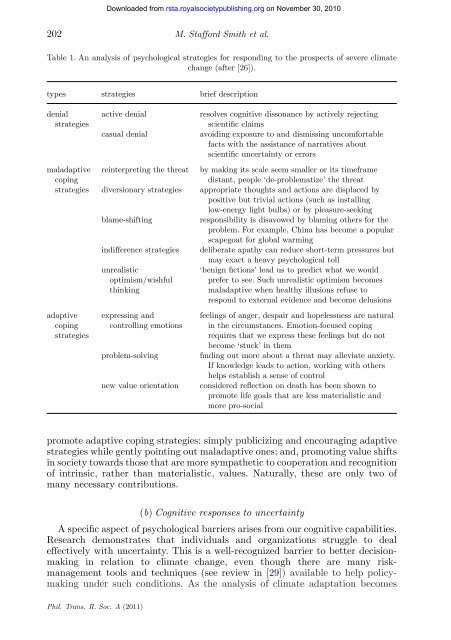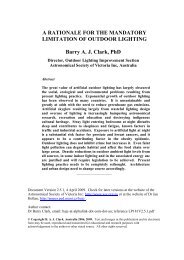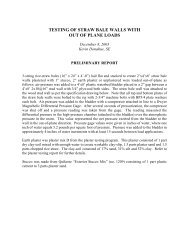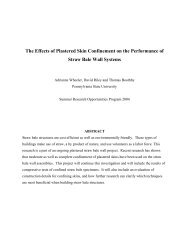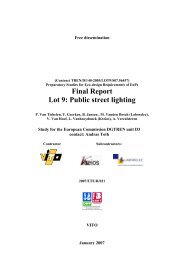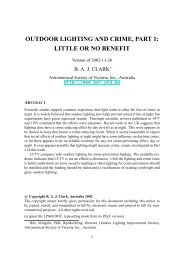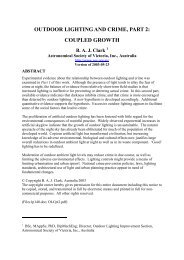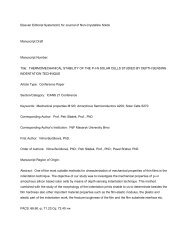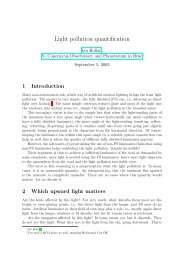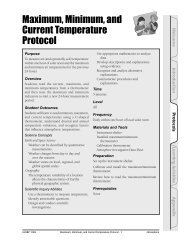Four degrees and beyond: the potential for a global ... - Amper
Four degrees and beyond: the potential for a global ... - Amper
Four degrees and beyond: the potential for a global ... - Amper
You also want an ePaper? Increase the reach of your titles
YUMPU automatically turns print PDFs into web optimized ePapers that Google loves.
202 M. Staf<strong>for</strong>d Smith et al.<br />
Table 1. An analysis of psychological strategies <strong>for</strong> responding to <strong>the</strong> prospects of severe climate<br />
change (after [26]).<br />
types strategies brief description<br />
denial<br />
strategies<br />
maladaptive<br />
coping<br />
strategies<br />
adaptive<br />
coping<br />
strategies<br />
active denial resolves cognitive dissonance by actively rejecting<br />
scientific claims<br />
casual denial avoiding exposure to <strong>and</strong> dismissing uncom<strong>for</strong>table<br />
facts with <strong>the</strong> assistance of narratives about<br />
scientific uncertainty or errors<br />
reinterpreting <strong>the</strong> threat by making its scale seem smaller or its timeframe<br />
distant, people ‘de-problematize’ <strong>the</strong> threat<br />
diversionary strategies appropriate thoughts <strong>and</strong> actions are displaced by<br />
positive but trivial actions (such as installing<br />
low-energy light bulbs) or by pleasure-seeking<br />
blame-shifting responsibility is disavowed by blaming o<strong>the</strong>rs <strong>for</strong> <strong>the</strong><br />
problem. For example, China has become a popular<br />
scapegoat <strong>for</strong> <strong>global</strong> warming<br />
indifference strategies deliberate apathy can reduce short-term pressures but<br />
unrealistic<br />
optimism/wishful<br />
thinking<br />
expressing <strong>and</strong><br />
controlling emotions<br />
may exact a heavy psychological toll<br />
‘benign fictions’ lead us to predict what we would<br />
prefer to see. Such unrealistic optimism becomes<br />
maladaptive when healthy illusions refuse to<br />
respond to external evidence <strong>and</strong> become delusions<br />
feelings of anger, despair <strong>and</strong> hopelessness are natural<br />
in <strong>the</strong> circumstances. Emotion-focused coping<br />
requires that we express <strong>the</strong>se feelings but do not<br />
become ‘stuck’ in <strong>the</strong>m<br />
problem-solving finding out more about a threat may alleviate anxiety.<br />
If knowledge leads to action, working with o<strong>the</strong>rs<br />
helps establish a sense of control<br />
new value orientation considered reflection on death has been shown to<br />
promote life goals that are less materialistic <strong>and</strong><br />
more pro-social<br />
promote adaptive coping strategies: simply publicizing <strong>and</strong> encouraging adaptive<br />
strategies while gently pointing out maladaptive ones; <strong>and</strong>, promoting value shifts<br />
in society towards those that are more sympa<strong>the</strong>tic to cooperation <strong>and</strong> recognition<br />
of intrinsic, ra<strong>the</strong>r than materialistic, values. Naturally, <strong>the</strong>se are only two of<br />
many necessary contributions.<br />
(b) Cognitive responses to uncertainty<br />
A specific aspect of psychological barriers arises from our cognitive capabilities.<br />
Research demonstrates that individuals <strong>and</strong> organizations struggle to deal<br />
effectively with uncertainty. This is a well-recognized barrier to better decisionmaking<br />
in relation to climate change, even though <strong>the</strong>re are many riskmanagement<br />
tools <strong>and</strong> techniques (see review in [29]) available to help policymaking<br />
under such conditions. As <strong>the</strong> analysis of climate adaptation becomes<br />
Phil. Trans. R. Soc. A (2011)<br />
Downloaded from<br />
rsta.royalsocietypublishing.org on November 30, 2010


